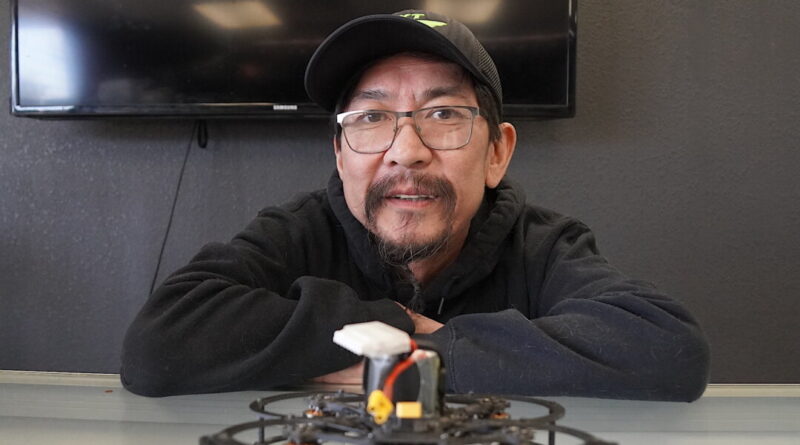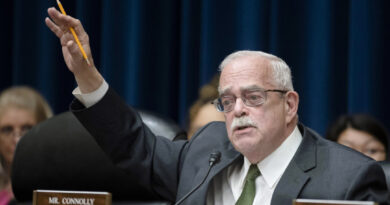Drone Operators Concerned About Proposed New Regulations Following Nationwide Aerial Sightings
A Missouri lawmaker is pushing for a ban on the use of drones and components manufactured in China by the state government.
MESA, Ariz.—Pete Phimphavong, the owner of Rekt Drones in Mesa, Arizona, has experienced numerous fluctuations in the drone industry throughout his seven-year journey of selling, servicing, and test-flying both commercial and recreational drones.
“There’s been a lot happening in the industry lately,” Phimphavong mentioned. “Especially with the approaching holiday season.”
“It’s not just the concerns surrounding drones but also the potential tariffs on the horizon,” he added.
Phimphavong was referencing President-elect Donald Trump’s warning of 100-percent import tariffs on nations that seek to replace the U.S. dollar, particularly China.
He expressed that such tariffs would lead to higher prices for his products and adversely affect his business.
Phimphavong is still grappling with how to interpret recent reports of unidentified drone sightings across the nation, especially in New York and New Jersey.
“These objects hovering for five hours—who knows what they are?” he pondered.
The Federal Aviation Administration (FAA) has recently designated a no-fly zone over parts of New Jersey as a safety precaution.
The statement indicates that thousands of commercial, recreational, and law enforcement drones navigate the skies daily, with over a million drones officially registered with the FAA in the United States.
As of December 2, the FAA reported a tally of 403,358 commercial drone registrations, 387,355 recreational registrations, and 423,047 certified remote pilots.
Upon reviewing technical data and eyewitness accounts, federal agencies noted that the sightings thus far comprise a mix of lawful commercial drones, hobbyist drones, law enforcement units, manned aircraft, helicopters, and even stars misidentified as drones.
“We have not identified anything abnormal and do not consider the activities to pose a national security or public safety concern in civilian airspace in New Jersey or other northeastern states,” the joint statement clarified.
A few reports have also surfaced regarding drone sightings above military sites in New Jersey and other restricted airspaces.
The statement emphasized that such sightings near Department of Defense (DOD) facilities are not uncommon.
“The DOD treats unauthorized access to its airspace seriously and collaborates closely with federal, state, and local law enforcement agencies as necessary,” the departments stated.
“Local commanders actively ensure there are effective detection and mitigation strategies in place.”
Organizations advocating for private drone operators are observing the situation vigilantly.
“Like many in the industry, we are keenly tracking the ongoing developments and proposed legislation related to drone sightings, sharing concerns regarding the ambiguity surrounding the aircraft operators,” expressed Jay Hanna, a founding member of the National Drone Operators Association, in a conversation with The Epoch Times.
“It is disconcerting that so much time has elapsed without identifying the individuals responsible for these drones.”
Hanna noted that images of alleged drones appeared more like winged aircraft than conventional quadcopters.
Hanna remarked that the organization continues to navigate the current regulatory landscape.
“However, I anticipate that further legislation will likely be enacted in the future, potentially imposing additional restrictions on public drone use. We will stay informed and adjust as needed to ensure compliance and facilitate smooth operations.”
Phimphavong mentioned that increased regulations translate to more legal challenges for both commercial drone users and hobbyists.
“As things progress, drones are becoming more integrated into our society. A few bad actors can spoil it for everyone,” he stated.
Following recent drone sightings, New Jersey Governor Phil Murphy expressed support for the Safeguarding the Homeland from the Threats Posed by Unmanned Aircraft Systems Act of 2023.

Multiple drones are seen over Bernardsville, N.J., on Dec. 5, 2024 Brian Glenn/TMX via AP
The proposed legislation would empower the Department of Homeland Security and the Department of Justice to more effectively regulate unmanned aircraft, including drones. Congress has yet to act on the bill.
The current FAA regulations limit commercial and personal drones to a maximum altitude of 400 feet and a speed limit of 100 mph.
Missouri state Rep. Dean van Schoiack, a Republican, believes that the increasing reports of unmanned aerial vehicles have caused a widespread psychological impact. He has received feedback from constituents reporting drone sightings.
“I had one individual mention seeing a drone in the sky for four hours. Whether or not it was a drone, I cannot say,” Van Schoiack told The Epoch Times.
He has proposed two bills aiming to bolster safety, security, and privacy in Missouri’s airspace regarding drones and other unmanned aircraft operations.
Additionally, drone flights over privately-owned land would necessitate the owner’s consent.
“Currently, many people believe they can operate drones freely in the sky and survey whatever they choose. That’s an infringement on property rights,” Van Schoiack stated.
HB209 would also ban drone operations over large public venues, such as sports stadiums.
Van Schoiack cited an incident where 15 unauthorized drones were spotted flying over during the Kansas City Chiefs versus Buffalo Bills playoff game on January 23, 2022, in Kansas City.
He warned of the potential serious consequences had one of the drones collided with the audience.
Van Schoiack filed HB210 in early December to tackle rising security worries stemming from drone sightings.
“I wish the government would provide us with clearer information. They’re just not communicating with the public, for whatever reason,” he expressed.
“If these are civilian drones, why are they operating at night? There has to be a deliberate reason behind it. These occurrences are not coincidental; there’s intent behind them—so what is that intent?”
The countries highlighted in HB210 include China, Russia, Iran, Korea, Cuba, Venezuela, and Syria.
Manufactured in China
Companies like Da-Jiang Innovations (DJI), which produces drones for personal and commercial applications, would fall into this category, according to Van Schoiack.
At the federal level, the Countering CCP Drones Act within the National Defense Authorization Act of 2025 initially proposed a ban on DJI and similar Chinese drone manufacturers from marketing their products in the United States.
However, the finalized bill did not incorporate this prohibition but instead mandated a risk assessment for drones produced in China.

A DJI Mavic 2 Pro and DJI Mavic Mini made by the Chinese drone maker fly near each other in Miami, Fla, on Dec. 15, 2021. Joe Raedle/Getty Images
“DJI welcomes scrutiny and looks forward to showcasing our privacy protocols and security features,” the company stated.
“DJI should be granted a fair opportunity and allowed due process to either substantiate or address any potential findings from the evaluation since no technology audit is ever flawless.”
DJI has reported conducting “regular audits of its products since 2017 and has incentivized external security researchers to pinpoint vulnerabilities through a bug bounty initiative.”

A drone operator helps to retrieve a drone after photographing over Hart Island in New York City on April 29, 2018. Seth Wenig/AP Photo
Market analysts predict that consumer drone sales in the U.S. will exceed $1.4 billion by 2029, according to statista.com.
Autel Robotics, another drone manufacturer based in China, expressed its concerns regarding the ongoing reports of unmanned aircraft over the Northeast.
The company believes that claims regarding Autel technology being misused for illicit purposes are baseless and speculative.
“We extend our heartfelt sympathies to the innocent civilians impacted during conflicts and sincerely wish for a business climate conducive to peaceful progress,” the company stated.





